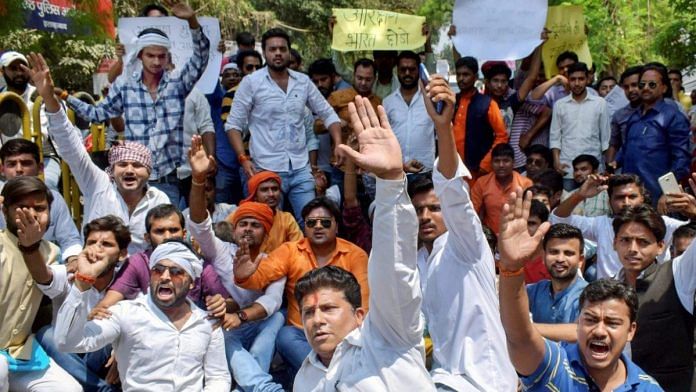As Dalits demand ordinance to undo Supreme Court’s ‘dilution’ of the SC/ST (Prevention of Atrocities) Act, Centre tells court the entire judgment is ‘vitiated’.
New Delhi: The Centre has resorted to a major damage control exercise in its review petition filed in the Supreme Court on its judgment on the Scheduled Castes and Scheduled Tribes (Prevention of Atrocities) Act.
Asking the apex court to recall the directions it issued, the government said the case deals with an “issue of very sensitive nature that has caused a lot of commotion in the country & is also creating anger, unease and a sense of disharmony”.
Taking the scope of the review petition beyond the given case and reminding the court of the separation of powers, the government has submitted that “in India, separation of powers being part of the basic structure of the Constitution, there was no room for the court declaring that it could legislate and make plenary law”.
By doing so, the government has written, is “impermissible”.
It has also told the court that declaring that its role “travels beyond merely dispute settling, and directions can certainly be issued which are not directly in conflict with a valid stature”, and submitted that the entire judgment is “vitiated”.
The judgment made it mandatory for the appointing authority (in the case of a public servant) to sanction the arrest before the police officer can exercise his jurisdiction under the Atrocities Act or the Code of Criminal Procedure. In the case of a non-public servant, a senior superintendent of police has to authorise the arrest. In response to this, the government has written, “the court is not filling in gaps, but on the other hand, is amending through judicial legislation, the Atrocities Act and the Code, thereby defeating the salutary provisions of the Act”.
The 20 March judgment by the Supreme Court sparked widespread protests by Dalit groups across the country, resulted in the death of nine people.
While the government was a party in the Supreme Court case, it had sought to distance itself from the judgment in the face of a strong political and social backlash – including from Dalit leaders within the BJP.
The government’s petition is seen as a desperate attempt to calm Dalits, who had come to support the BJP in the 2014 general elections.




I don’t think the review petition will succeed. The petitioner’s case seems to be that an element of absence of application of mind, arbitrariness, lack of forethought is required for the Atrocities Act to serve as a deterrent. 2. Now contrast this with how MLA Sengar’s case has unfolded in practice. For almost one year, a minor girl is unable to get an FIR registered, whereas her complaint itself ought to have led to arrest and denial of bail. When, after the tragic loss of her father’s life, an offence is registered under the drastic POSCO Act, again there is no arrest, the ball is lobbed into the CBI’s court. 3. At some level, when Dalits see the wide gap between theory and practice, they get deeply upset.